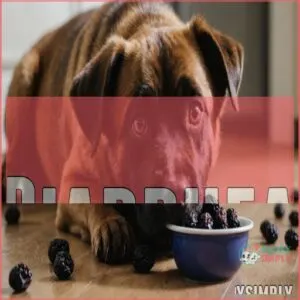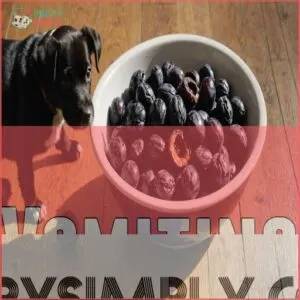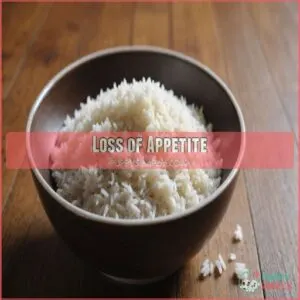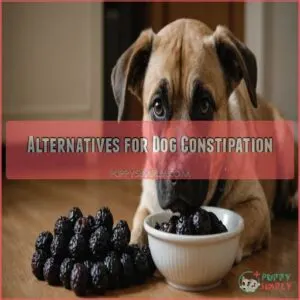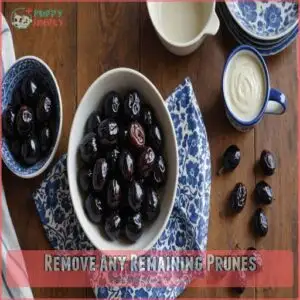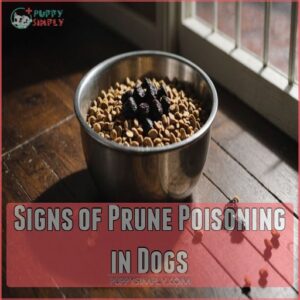This site is supported by our readers. We may earn a commission, at no cost to you, if you purchase through links.
 Dogs love a good treat, but can dogs eat prunes? Not the best idea! While prunes aren’t as toxic as grapes, they can still upset your pup’s tummy.
Dogs love a good treat, but can dogs eat prunes? Not the best idea! While prunes aren’t as toxic as grapes, they can still upset your pup’s tummy.
Think of them as a heavyweight champ in the fiber and sugar department—too much can lead to diarrhea, vomiting, and bloating. Dogs with sensitive stomachs or conditions like diabetes should definitely steer clear.
If your canine companion inadvertently snacks on one, keep an eye out for any signs of discomfort.
Curious about safe alternatives? Considering the risks of common human treats like cake toxicity risks, there are fruity options that’ll keep your dog’s tail wagging without the tummy ache. Stick around for more ideas!
Table Of Contents
- Key Takeaways
- What Are Prunes for Dogs
- Can Dogs Eat Prunes
- Risks of Prunes for Dogs
- Alternatives for Dog Constipation
- What to Do if a Dog Eats Prunes
- Prevention of Prune Ingestion
- Signs of Prune Poisoning in Dogs
- Frequently Asked Questions (FAQs)
- Why do dogs eat prunes?
- Can dogs eat prunes for constipation?
- Are prunes poisonous to dogs?
- What happens if a dog eats a prune?
- What happens if my dog eats prunes?
- Is prune juice good for dogs with constipation?
- Which dry fruits can dogs eat?
- Are there any fruits dogs can’t eat?
- How to store prunes safely around dogs?
- Can prunes cause allergic reactions in dogs?
- Are there dog treats flavored with prunes?
- Do prunes affect dog dental health?
- How to train dogs to avoid prunes?
- Conclusion
Key Takeaways
- You shouldn’t feed prunes to your dog as they contain too much sugar and fiber, which can cause diarrhea, vomiting, and bloating.
- If your dog accidentally eats prunes, provide fresh water, monitor for symptoms like lethargy or abdominal pain, and contact your vet if symptoms persist.
- For dogs with constipation, you’re better off using cooked, mashed pumpkin instead of prunes as a safe, natural remedy.
- You’ll want to store prunes securely in high cabinets or sealed containers, and train your dog to leave food alone using positive reinforcement.
What Are Prunes for Dogs
So, what are prunes, exactly? They’re simply dried plums, but for your dog, that means they’re packed with sugar and fiber—a potentially problematic combo.
Dried Plums
Before you start sharing your dried plum recipes with your furry friend, hold that thought.
Prunes, after all, are dried plums and, much like raisins, they come with hidden risks for pups.
While dried plums boast health benefits for humans, such as aiding digestion, the story’s different for dogs.
Keep these chewy goodies out of their reach to prevent digestive issues.
High in Sugar and Fiber
Think prunes are just dried plums? There’s more. They’re packed with sugar and fiber, leading to digestive upset. Here’s the lowdown:
- Sugar overload: Beware of diabetes risk.
- Fiber benefits: Great for humans, tricky for dogs.
- Digestive woes: Expect bloating and cramps.
- Seek sugar alternatives: Choose safer treat alternatives.
- Treat alternatives: Opt for something less sticky.
Wag wisely, keep those prunes out of reach!
Pits Contain Cyanide
You’ve got prunes with all that sugar, and now there’s another twist—those pesky pits.
They’re not just hard; they pack a real punch with cyanide, which is toxic to dogs.
Imagine trying to snack while dodging tiny bombs!
This risk alone makes those pits a no-go for your pup’s snacks.
Stick to safer treats to keep Fido’s tail wagging.
Can Dogs Eat Prunes
You might think sharing prunes with your dog sounds harmless, but think again—these dried plums are packed with sugar and can upset their stomach.
Instead of risking a battle with bloating and discomfort, opt for safer treats that your furry friend can actually enjoy.
No, Prunes Are Not Recommended for Dogs
Prunes aren’t the best treat for your four-legged buddy.
While they might seem like a fruity delight, they’re basically dried plums, which contain pit-related hazards.
Their high sugar content and potential for digestive upset make them a risky choice.
Imagine this: a belly full of prunes could lead to a not-so-fun experience for both of you, like an unexpected visit to the vet.
Stick to safer snacks like carrots or blueberries.
High Sugar Content Can Cause Digestive Issues
Eating prunes presents a sugary challenge for your canine companion. Their high sugar content can wreak havoc on your dog’s digestion.
This is especially true for dogs with diabetes.
Here’s what you need to know:
- Sugar overload can lead to diarrhea.
- Upset tummies are a common side effect.
- It’s best to avoid sugary treats altogether.
- Opt for healthier Dog Treats instead. Homemade treats are a great option!
Difficult for Dogs to Digest
The high sugar content isn’t the only concern when giving prunes to your dog.
They’re tricky for dogs to digest and can lead to digestive upset.
If you’re still looking for healthy snack alternatives, consider exploring dog prune snacks that cater to your pup’s needs.
Picture your pup dealing with stomach bloat or a prune pit causing a gastrointestinal blockage—definitely not a fun day!
So, if your furry friend has food sensitivities, keeping prunes out of reach is wise.
Risks of Prunes for Dogs
You might think prunes are a harmless treat for your furry friend, but they can cause some pesky problems like diarrhea, vomiting, and cramping.
If you’ve ever dealt with a dog experiencing these issues, you know it’s not pretty, so it’s best to keep prunes off their menu.
Diarrhea
If your dog nibbles on prunes, watch out for diarrhea.
These sugary snacks can turn your pup’s bathroom routine into a bit of a mess.
Think of prunes like nature’s laxatives—great for you, but not so for Fido.
Keep water handy, and consult your vet for remedies.
Prevention is key to avoiding such gut-wrenching situations!
Vomiting
You might find Spot with his head over the bowl if prunes are in the mix.
Vomiting can hit suddenly due to their high sugar content.
If your dog is experiencing frequent vomiting, it’s important to provide a soothing diet, such as dog food for sensitive stomachs, to help calm their stomach.
Here’s what to do:
- Monitor closely: Assess vomiting frequency.
- Identify triggers: Check if prunes might be the culprit.
- Seek help: Consult your vet for vomiting prevention and treatment.
Prunes and pups don’t mix!
Cramping
Cramping is another pesky side effect to watch out for if your dog has eaten prunes.
Much like when you eat too much at Thanksgiving dinner, your furry friend might experience belly cramps.
Causes of cramping include high fiber and sugar content in prunes, which aren’t ideal for doggy digestion.
Keep a watchful eye and contact your vet if discomfort lingers.
Bloating
Bloating might sound like something that happens after a big meal, but for dogs, it can be a real bellyache with prunes.
Those sugary snacks can cause gas and abdominal distention, leaving your furry friend feeling about as comfortable as a cow in a hammock.
Keep an eye on any stomach pain signs and provide plenty of fresh water.
Loss of Appetite
Because of their high fiber and sugar content, prunes can leave your dog feeling less than thrilled about mealtime.
This loss of appetite, a common side effect, can be a real bummer for both you and your furry friend.
Here’s what you should know:
- Monitor your dog’s food intake closely.
- If appetite loss persists, contact your vet.
- Offer bland, easily digestible foods.
Alternatives for Dog Constipation
If your dog’s got a sluggish tummy, there are safer options than prunes to get things moving.
Cooked, mashed pumpkin or other dog-friendly fruits and veggies can help your furry friend find relief without risking tummy trouble.
Cooked, Mashed Pumpkin
When your dog’s tummy woes strike, a scoop of cooked, mashed pumpkin might just do the trick.
Picture it as nature’s gentle laxative, ready to keep things moving without the drama.
Pumpkin for dog constipation is a popular go-to because it’s packed with fiber, which helps regulate digestion.
Plus, just like pumpkin seeds or chia seeds are safer alternatives to poppy seed muffins toxicity, it’s safe and often doubles as a tasty dog treat.
With pumpkin for dog diarrhea, its moisture and nutrients help restore balance.
Think of it as a trusty pal in your canine’s gut health journey, offering relief with a flair of pumpkiny goodness!
Other Fruits and Vegetables Specifically Recommended for Dogs
Ever wonder what fruits and veggies are safe for your furry friend?
Dogs can enjoy apples, bananas, and blueberries, offering a healthy punch of vitamins and antioxidants.
For severe cases of constipation, consider exploring dog constipation treats that are specifically designed for canine digestive health.
Need a veggie snack?
Carrots, celery, and green beans are perfect!
They’re like hitting the jackpot—crunchy, tasty, and loaded with fiber.
But steer clear of onions and grapes; these human foods can be dangerous for dogs.
Always remember, what’s healthy for humans isn’t always dog-friendly.
So next time your pup gives you those puppy eyes, toss them a safe veggie treat instead.
They’ll wag in gratitude!
What to Do if a Dog Eats Prunes
If your pup has gotten into the prunes, don’t panic—safely removing any leftover prunes and providing fresh water are good first steps.
Keep an eye on Fido for any signs of tummy trouble like vomiting or diarrhea, and if symptoms stick around or get worse, a call to the vet is a smart move.
Remove Any Remaining Prunes
So, you’ve discovered your furry friend munching on prunes.
First things first, get those sneaky snacks out of reach.
Consider these steps for prune removal:
- Sweep the area for any leftover prunes.
- Secure them in a safe spot beyond paw’s reach.
- Check other hiding spots, like under furniture.
- Toss them out if you can’t stash them securely.
Stay vigilant to keep your pup out of prune trouble!
Provide Fresh Water
After you’ve gotten rid of any leftover prunes, make sure your furry friend has access to fresh water.
Good hydration keeps your dog’s system running smoothly, like oil in a car’s engine.
Regular water intake helps flush out their system, promoting better dog health.
Check the water bowl regularly, ensuring it’s always filled with clean, quality water.
Monitor for Symptoms
Keep a close eye on your pup.
Watch for these signs: 1. vomiting, 2. diarrhea, 3. lethargy, or 4. abdominal pain.
These symptoms could mean trouble.
Don’t panic, but keep a watchful eye.
Plenty of fresh water is key.
If things don’t improve, it’s time to call your vet.
Remember, prevention is better than cure!
Contact a Veterinarian if Symptoms Persist or Worsen
When your pup starts showing prune ingestion symptoms like vomiting or lethargy, it’s time to dial the vet.
They’ll provide urgent care advice for dog health concerns.
Here’s the scoop:
| Symptom | Possible Cause | Action |
|---|---|---|
| Vomiting | Prune poisoning | Monitor closely |
| Lethargy | Digestive distress | Call vet |
| Diarrhea | High sugar effect | Hydrate |
Act swiftly to keep tails wagging!
Prevention of Prune Ingestion
To keep your curious dog from snacking on prunes, store them securely and out of reach, much like hiding cookies from a sneaky toddler.
Always supervise your furry friend around food, and train them to leave treats alone, turning a potential mess into a fun training opportunity instead!
Keep Prunes and Other Dried Fruits Out of Reach
Prunes and dried fruits might seem harmless, but they’re best far from your dog’s reach.
Consider them the candy jar at grandma’s house—tempting yet off-limits.
Store these chewy treats in high cupboards or sealed containers.
This keeps your pup’s curious nose out, but it also prevents digestive woes.
Remember, a clean countertop is a pet health tip worth following!
Supervise Dogs When Near Food
While it’s wise to store prunes safely, supervising your pup during mealtime is like having a lifeguard at a pool party—necessary for everyone’s peace of mind.
Dogs can be sneaky, and who hasn’t glanced away just to find Fido gobbled something questionable?
Keeping a watchful eye prevents uninvited snacking and guarantees your furry buddy stays safe around human food.
Train Dogs to Leave Food Alone
Training your dog to leave food alone is like teaching them not to gobble up your dinner.
Start with these steps:
- Positive Reinforcement: Reward good behavior with treats; it works like magic!
- Command Training: Use clear commands like "leave it."
- Distraction Techniques: Distract them with toys or playtime.
- Crate Training: A safe space means less counter-surfing adventures.
Store Prunes Securely
Ever wondered how to outsmart a curious dog?
Store prunes securely by using childproof containers or locking them in a secure pantry.
This simple tip, such as keeping poppy seed-containing foods securely stored to avoid opium poppy toxicity risks, prevents accidental ingestion and keeps your furry friend safe.
Think of it like hiding cookies from toddlers — only this time, it’s for your pet’s safety and well-being, especially when it comes to toxic plants like those with cyanogenic glycosides.
Signs of Prune Poisoning in Dogs
You’ve probably already guessed that if your dog’s eaten prunes, you should watch for some not-so-fun symptoms.
Keep an eye out for things like lethargy and belly aches – if you see anything concerning, it’s always best to call your vet.
Lethargy
Has your dog transformed into a furry couch potato?
Lethargy in dogs might seem like laziness, but it can signal something more serious, like prune poison fatigue, which is why it’s vital to learn about dog prune poisoning symptoms.
Imagine this: your usually-bouncy dog now lounging around with the energy of a napping cat.
This sudden lack of pep can be caused by dehydration or an upset stomach from those sugary prunes they weren’t supposed to eat.
It’s a bit like post-Thanksgiving dinner sluggishness—but for dogs.
If your pup’s energy is dragging, keeping an eye out and giving your vet a call might be a life-saver.
Remember, a tired dog isn’t always just sleepy!
Abdominal Pain
Abdominal pain is a major red flag in dogs who’ve snacked on prunes.
Its severity can be reminiscent of cyanide poisoning risks.
Imagine your pup acting like they’re trying out for the role of "Grumpiest Canine"—that’s often a sign their tummy is troubled.
You might notice them hunched over or avoiding belly rubs, which used to be a personal favorite.
This discomfort is another symptom of prune poisoning, which can make your furry friend’s days feel like a never-ending Monday.
If this sounds like your dog’s recent vibe, it’s time to ring up the vet for a proper diagnosis and remedies to get their tail wagging again.
Frequently Asked Questions (FAQs)
Why do dogs eat prunes?
Pooches nibble prunes out of pure curiosity, mischievous munchies, or a quest for new tastes.
Although not toxic, prunes can prompt digestive dilemmas like bloating or cramps, making them a poor choice for canine snacks.
Can dogs eat prunes for constipation?
If your dog’s plumbing is backed up, skip the prunes.
They’re too sugary and fibrous, leading to more belly bloats than benefits.
Instead, try cooked pumpkin—it’s the fiber hero dogs need without the digestion drama.
Are prunes poisonous to dogs?
No, prunes aren’t poisonous, but they’re not ideal. Think of them as a sugary, fiber bomb! Too many can upset their tummy. Best to stick to dog-friendly treats.
What happens if a dog eats a prune?
Eating a prune might give your dog an upset stomach, leading to vomiting or diarrhea.
Watch out for any unusual signs like lethargy or abdominal pain.
If symptoms appear, call your vet and provide plenty of water.
What happens if my dog eats prunes?
Surprise, surprise! If your dog snags a prune, keep an eye out for tummy trouble like diarrhea or bloating.
Prunes aren’t toxic but can cause digestive woes.
Call your vet for advice if symptoms pop up.
Is prune juice good for dogs with constipation?
Prune juice might seem a quick fix for doggy constipation, but it’s a slippery slope.
The high sugar content can upset their stomachs even more.
Stick to safer options like cooked pumpkin for gentle relief.
Which dry fruits can dogs eat?
Your dog can safely enjoy dried cranberries, dried apples, and small amounts of dried coconut.
Stay away from raisins and dates.
Keep portions small, and always remove pits or seeds before serving.
Are there any fruits dogs can’t eat?
Dogs need to steer clear of several dangerous fruits.
Don’t feed them grapes, raisins, cherries, or wild mushrooms – they’re toxic and can cause kidney failure.
Also avoid tomatoes and onions for their harmful compounds.
How to store prunes safely around dogs?
Store these dried fruits in airtight containers on high shelves or in locked cabinets where your pup can’t reach them.
For extra safety, keep them in the fridge – it’s like a doggy-proof vault!
Can prunes cause allergic reactions in dogs?
While allergic reactions to prunes aren’t common in dogs, they can cause stomach upset and other digestive issues.
You’ll want to watch for signs like vomiting, diarrhea, or itching if your pup sneaks one.
Are there dog treats flavored with prunes?
You won’t find many commercial treats flavored with prunes since they’re not safe for dogs.
Instead, look for treats with dog-friendly fruits like blueberries or apples, and consider alternatives to pomegranate seeds, which can cause digestive upset in dogs. Instead, look for treats with dog-friendly fruits like blueberries or apples that offer similar nutritional benefits.
Do prunes affect dog dental health?
Prunes’ sticky texture and high sugar content can stick to your dog’s teeth, promoting plaque buildup and tooth decay.
It’s best to avoid them and stick to dental-friendly treats approved by veterinarians.
How to train dogs to avoid prunes?
Keep prunes out of sight in sealed containers.
Train your dog with the "leave it" command.
Reward them when they ignore food items.
Always supervise outdoor walks where fallen fruit might tempt them.
Conclusion
Now you know the scoop on whether dogs can eat prunes – they’re best kept as a human snack!
While your pup might give you those irresistible puppy eyes, stick to vet-approved treats instead.
Remember, there are plenty of safer alternatives like pumpkin that’ll keep your furry friend’s digestive system happy.
If your dog does sneak a prune, don’t panic – just keep an eye on them and call your vet if you notice any concerning symptoms.
Your dog’s health is worth the extra care!


